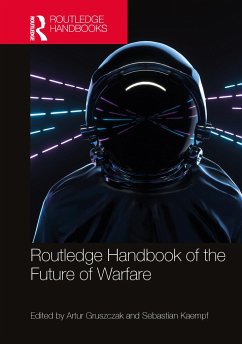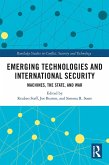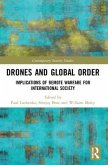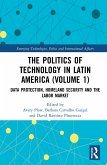This handbook provides a comprehensive, problem-driven and dynamic overview of the future of warfare.
The volatilities and uncertainties of the global security environment raise timely and important questions about the future of humanity's oldest occupation: war. This volume addresses these questions through a collection of cutting-edge contributions by leading scholars in the field. Its overall focus is prognostic rather than futuristic, highlighting discernible trends, key developments and themes without downplaying the lessons from the past. By making the past meet the present in order to envision the future, the handbook offers a diversified outlook on the future of warfare, which will be indispensable for researchers, students and military practitioners alike. The volume is divided into six thematic sections. Section I draws out general trends in the phenomenon of war and sketches the most significant developments, from the past to the present and into the future. Section II looks at the areas and domains which actively shape the future of warfare. Section III engages with the main theories and conceptions of warfare, capturing those attributes of contemporary conflicts which will most likely persist and determine the dynamics and directions of their transformations. The fourth section addresses differentiation and complexity in the domain of warfare, pointing to those factors which will exert a strong impact on the structure and properties of that domain. Section V focuses on technology as the principal trigger of changes and alterations in the essence of warfare. The final section draws on the general trends identified in Section I and sheds light on how those trends have manifested in specific local contexts. This section zooms in on particular geographies which are seen and anticipated as hotbeds where future warfare will most likely assume its shape and reveal its true colours.
This book will be of great interest to students of strategic studies, defence studies, war and technology, and International Relations.
The volatilities and uncertainties of the global security environment raise timely and important questions about the future of humanity's oldest occupation: war. This volume addresses these questions through a collection of cutting-edge contributions by leading scholars in the field. Its overall focus is prognostic rather than futuristic, highlighting discernible trends, key developments and themes without downplaying the lessons from the past. By making the past meet the present in order to envision the future, the handbook offers a diversified outlook on the future of warfare, which will be indispensable for researchers, students and military practitioners alike. The volume is divided into six thematic sections. Section I draws out general trends in the phenomenon of war and sketches the most significant developments, from the past to the present and into the future. Section II looks at the areas and domains which actively shape the future of warfare. Section III engages with the main theories and conceptions of warfare, capturing those attributes of contemporary conflicts which will most likely persist and determine the dynamics and directions of their transformations. The fourth section addresses differentiation and complexity in the domain of warfare, pointing to those factors which will exert a strong impact on the structure and properties of that domain. Section V focuses on technology as the principal trigger of changes and alterations in the essence of warfare. The final section draws on the general trends identified in Section I and sheds light on how those trends have manifested in specific local contexts. This section zooms in on particular geographies which are seen and anticipated as hotbeds where future warfare will most likely assume its shape and reveal its true colours.
This book will be of great interest to students of strategic studies, defence studies, war and technology, and International Relations.
'The editors have assembled an impressive and diverse collection of experts to describe and analyze how state and non-state actors will likely wield violence in the future. Taking a comprehensive and cutting-edge perspective, the volume covers a broad range of topics from new concepts of warfare to novel technologies of coercion and violence. This important volume will become a must-read for those seeking to understand how technology and trends will shape future warfare.'
Nina Tannewald, Brown University, Providence, Rhode Island, USA
'Any book that seeks to comprehensively survey not only the current landscape of military and security studies but also its volatile future sets for itself a daunting task, but this extraordinarily wide-ranging volume delivers the goods. Assembling an array of accomplished authors from a refreshingly broad range of national, geopolitical, and epistemological perspectives, The Routledge Handbook of the Future of Warfare is in equal parts informative and thought-provoking, offering a combination of sophisticated theory and insightful analysis of recent and contemporary events "on the ground." This book will be an indispensable resource for anyone looking to understand twenty-first century warfare in all its complexity, with particular appreciation of the paradoxical interplay between cutting-edge technology and elemental patterns of human conflict.'
Ward Thomas, College of the Holy Cross, Worcester, Massachusetts, USA
'Thinking about the future of war is by definition a difficult task. The speed, the secrecy, the intangible nature of strategy and culture make it perhaps the most difficult intellectual challenge to encounter. This book meets this challenge brilliantly. It invites reflection, change of perception, innovative thinking, addresses old and new questions we have about what is to come when it comes to war. It brings together the greatest minds of our times, and fills an important gap in the landscape on all things future.'
Florence Gaub, Research Director, NATO Defence College in Rome
Nina Tannewald, Brown University, Providence, Rhode Island, USA
'Any book that seeks to comprehensively survey not only the current landscape of military and security studies but also its volatile future sets for itself a daunting task, but this extraordinarily wide-ranging volume delivers the goods. Assembling an array of accomplished authors from a refreshingly broad range of national, geopolitical, and epistemological perspectives, The Routledge Handbook of the Future of Warfare is in equal parts informative and thought-provoking, offering a combination of sophisticated theory and insightful analysis of recent and contemporary events "on the ground." This book will be an indispensable resource for anyone looking to understand twenty-first century warfare in all its complexity, with particular appreciation of the paradoxical interplay between cutting-edge technology and elemental patterns of human conflict.'
Ward Thomas, College of the Holy Cross, Worcester, Massachusetts, USA
'Thinking about the future of war is by definition a difficult task. The speed, the secrecy, the intangible nature of strategy and culture make it perhaps the most difficult intellectual challenge to encounter. This book meets this challenge brilliantly. It invites reflection, change of perception, innovative thinking, addresses old and new questions we have about what is to come when it comes to war. It brings together the greatest minds of our times, and fills an important gap in the landscape on all things future.'
Florence Gaub, Research Director, NATO Defence College in Rome








